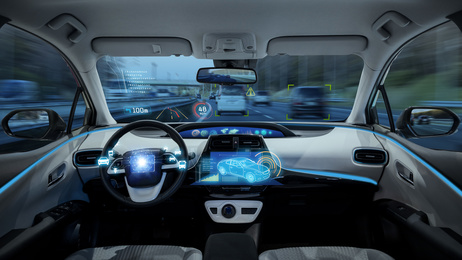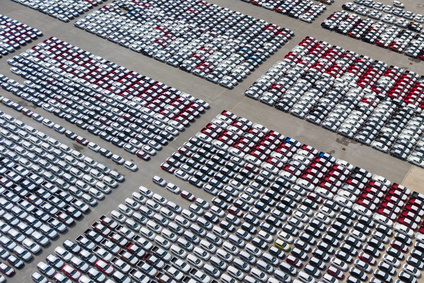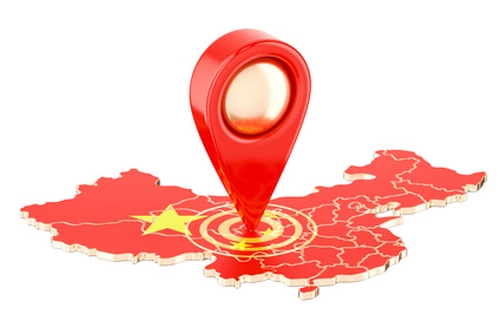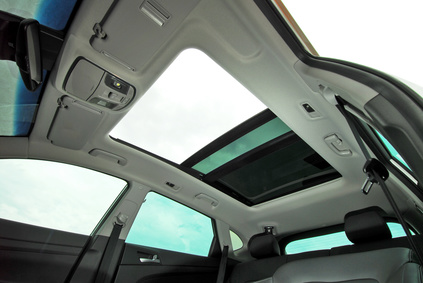Taiwan wants to enter the global automotive market in the next few years
So far, the East Asian island Taiwan is rather known for the production of electronic components, computers and smartphones. Numerous world-famous manufacturers such as Acer, Asus and HTC have their R & D centers and production facilities here. With a well-established supply chain and a high level of expertise in electronic component manufacturing, analysts say that Taiwan is ready to manufacture automotive products, especially for the growing number of electric cars.

There are already two respected companies in Taiwan that produce electric cars or components for it. Xing Mobility Inc. already has a serial production ready vehicle. However, production is limited to 19 units and is more likely to be seen as a platform for R & D on electrically powered cars. Royce YC Hong, Chairman of Xing Mobility, sees his company in the future more as a supplier of electric drivetrains and motors and less as a vehicle manufacturer. Because the US-based manufacturer of electric cars, Tesla, has had its components manufactured in Taiwan at the beginning of its development work for their first production vehicle Tesla Roadster. The current CTO of Xing Mobility, Azizi Tucker, is also a former Tesla employee.
Another manufacturer, Electric Power Techology Limited, with its Hong Kong-registered subsidiary Thunder Power has been more in the Chinese market so far. In the future, Taiwan could serve as a production site for the electronic components. Thunder Power has recently unveiled a prototype with a 125 kWh battery and a mileage of 650 km. This is a new high in the field of fully electrically powered cars. In addition, the company has been able to employ experienced professionals from well-known car manufacturers, has registered 70 electromobility patents, and has secured $ 500 million in financial support from JP Morgan.
All steps of the Taiwan Certification should be taken seriously, as the requirements are not inferior to those of international procedures. If you are looking for a reliable partner for your Taiwan certification, do not hesitate to contact us personally. Please write us an Email or call us directly (UK: +44 2071931135, Rest of Europe: +49 69 2713769150, US: +1 773 654-2673). We gladly support you.
Visit our Website or our News Section for regular updates on the subject of Taiwan Certification, CCC and other certifications for the Chinese market.
„In Compliance“-Magazine Publishes Article about New CCC Marking Requirements
In May 2018, new marking requirements for the CCC certification came into force. The “In Compliance” magazine has now published a professional article about this major reform. It was written by Julian Busch, Managing Director of MPR China Certification GmbH. You can find a link to the article here.

The reform of the marking requirements was already covered by an article issued earlier on our website. Please find below a summary with the most important changes:
- The small “S” from the CCC logo will be omitted in the future
Markings of already certified components should be adapted by the manufacturers “within the product cycle”. For new components, only the new logo applies. - Elimination of the permission of printing (PoP)
There will not be a PoP anymore for new products. The responsibility for a correct marking thus completely lies with the suppliers now as the review of the PoP through the Chinese authority is also omitted. - For certain product groups, such as brake hoses, there are specific marking regulations that differ e.g. in terms of size and design of the CCC logo
The CCC marking requirements should always be completely understood and marked accordingly. Otherwise, the import of CCC-certified products to China could lead to difficulties at customs, culminating in the detentions or even confiscation or destruction of goods.
If you have any questions about the new regulations for the marking of CCC certified products or if you need further counseling on how this may affect your projects, please do not hesitate to contact us.
For more information about the CCC certification in general, the process, and the associated costs, please visit our website and our news Section where you will find current updates twice a week.
You can contact us via e-mail, or call us directly (UK: +44 2071931135, Rest of Europe: +49 69 2713769150, US: +1 773 654-2673).
You can also check out our free CCC-Brochure, which can be downloaded right here as a PDF file or you consult our book (in English) “A Brief Guide to CCC: China Compulsory Certification”, which can be found directly here on Amazon.
Additional Methods of Certification for Certain Product Groups Possible
In annex 1 of announcement No. 11-2018, the Certification and Accreditation Authority of China (CNCA) recently announced that certain products do not require the CCC certification anymore (Link to News).

According to annex 2 of the official announcement, further changes will come into force on October 1, 2018: Manufacturers can then issue a CCC self-declaration for selected product groups as an alternative to the usual CCC certification process. The basic process of the self-declaration is described in a new implementation rule recently published by the CNCA: CNCA-00C-008: 2018. The process is similar to that of the CE marking, however it is important to note that the CCC certification is still compulsory for the affect product groups. The respective GB standards remain valid and product compliance in accordance with Chinese regulations remains mandatory during the entire production of the product. Annual product tests according to the GB standard remain compulsory.
The main difference between the current CCC process and the self-declaration is that the latter does not require an audit. Instead all necessary information must be prepared by the manufacturer and uploaded into an online system. Product testing is still compulsory, but will be differentiated for the following two types” A” and “B” in the future. For “Type A” products, manufacturers may choose the laboratory to test their products. In contrast, “Type B” products may only be tested in test laboratories accredited by the Chinese authority CNAS.
The potential omission of the audit could streamline the CCC process, however in the event of problems or deficiencies, manufacturers will be held directly liable and will face much more severe penalties. It can be expected that customs inspections and vehicle inspections will be intensified in order to detect possible problems such as incomplete or incorrect information in the self-declaration. In addition, in the initial phase of the self-declaration further uncertainties and changes by the certification authority can be expected. Also the handling of the self-declaration is critical for the homologation of the complete vehicle as the Conformity of Production (CoP) to the GB-Standards must be fulfilled at all times. As this is not ensured when using a self-declaration the responsibility lies with the car manufacturer.
For this reason, we recommend staying to the known certification process.
Maintaining the current certification process in direct cooperation with the certification authority is in our view the more risk-averse approach of the CCC certification for suppliers and vehicle manufacturers.
Please find below an unofficial translation of the CNCA list of products for which the CCC self-declaration can alternatively be carried starting from October 1, 2018:
| Type | Product Name | CNCA Implementation Rules |
| A | Information technology equipment, audio- and visual equipment with a nominal rated voltage equal to or less than 5VDC, nominal rated power consumption less than 15W (or 15VA), and non-rechargeable battery equipment (Class III equipment) | CNCA-C08-01:2014
CNCA-C09-01:2014 |
| B | 1. Low-voltage switchgear: complete power switchgear, busbar trunking systems (busway/bus duct), distribution board, low-voltage complete reactive power compensation devices | CNCA-C03-01:2014 |
| B | 2. Small-power motors | CNCA-C04-01:2014 |
| B | 3. Small AC arc welding machines
4. AC arc welding machines 5. DC arc welding machines 6. TIG arc welding machines 7. MIG/MAG arc welding machines 8. Submerged arc welding machines 9. Plasma arc cutting machines 10. Plasma arc welding machines 11. Arc welding transformer anti-electric shock device 12. Welding cable coupling device 13. Resistance welding machine 14. Wire feeding device 15. TIG welding torch 16. MIG/MAG welding torch 17. Electrode holder |
CNCA-C06-01:2014 |
| B | 18. Motor-compressors | CNCA-C07-01:2017 |
| B | 19. Automotive interior parts | CNCA-C11-09:2014 |
| B | 20. Car door locks and door hinges | CNCA-C11-10:2014 |
Are your products affected by the new regulations?
Do you have any questions?
Please do not hesitate to contact us, we are happy to advise you on all CCC related issues.
For more information about the CCC certification in general, the process, and the associated costs, please visit our website and our news Section where you will find current updates twice a week.
You can contact us via e-mail, or call us directly (UK: +44 2071931135, Rest of Europe: +49 69 2713769150, US: +1 773 654-2673).
You can also check out our free CCC-Brochure, which can be downloaded right here as a PDF file or you consult our book (in English) “A Brief Guide to CCC: China Compulsory Certification”, which can be found directly here on Amazon.
China Lowers Import Duties for Cars
As the Chinese Government announced, import tariffs for motor vehicles will be cut by 10 percentage points to only 15%.
Import duties for automotive components will even be cut by 19 percentage points, down to only 6%.
Recently, many of the Chinese automotive regulations were reduced as well. This combined with the lower import duties will make the Chinese market more open for foreign car manufacturers. For smaller manufacturers of premium or niche vehicles, the recent changes are likely to facilitate the entry into the world’s fastest-growing automotive market.

CCC certification is becoming more and more important to ensure the safety of imported vehicles and components.
For more information on how CCC certification could impact your business, or information on CCC certification in in general, its process, and associated costs, visit our website and news section, where you will find up-to-date information twice a week.
Please do not hesitate to contact us for further details and advice. You can contact us via e-mail or call us on +49692713769150.
You can also view our free CCC brochure, which you can download here as a PDF file, or you can consult our book “CCC: China Compulsory Certification”, which can be found directly here on Amazon.
CNCA Announces Omission of Compulsory CCC Certification for Certain Products
In June 2018, the Certification and Accreditation Authority of China (CNCA) published an announcement No. 11-2018 which includes a list of products that will no longer be subject to CCC certification in China. As of now, affected products may no longer be marked with the CCC logo.
However, the respective product requirements, which are laid down in the national Chinese standards, the so-called GB standards, continue to apply. In order to be able to legally import or sell products in China, conformity with Chinese standards is essential.

The most reliable way to guarantee and demonstrate conformity of production is ensured through a voluntary certification. The Chinese Certification Authorities China Quality Certification Center (CQC) and the China Certification Center for Automotive Products (CCAP) also offer to convert existing CCC certificates into voluntary CQC or CCAP certificates. The basic process of voluntary certifications and the corresponding follow-ups are almost identical to the CCC certification, only the logo for the marking is different.
Please find below an unofficial translation of the list published by the CNCA:
| Product Names | CNCA Implementation Rules |
| Spray guns for non-flammable liquids | CNCA-C05-01:2014 |
| Electric scissors | CNCA-C05-01:2014 |
| Tappers | CNCA-C05-01:2014 |
| Electric chain saws | CNCA-C05-01:2014 |
| Electric planers | CNCA-C05-01:2014 |
| Electric pruning shears | CNCA-C05-01:2014 |
| Color picture tubes | CNCA-C08-01:2014 |
| Antenna amplifiers | CNCA-C05-01:2014 |
| Computer gaming machines | CNCA-C09-01:2014 |
| Learning machines | CNCA-C09-01:2014 |
| Motorcycle engines | CNCA-C11-03:2014 |
| Motor vehicle horns | CNCA-C11-05:2014 |
| Motor vehicle brake hoses | CNCA-C11-06:2014 |
| Car fuel tanks | CNCA-C11-11:2014 |
| Modems (with card) | CNCA-C16-01:2014 |
| ISDN Terminals | CNCA-C16-01:2014 |
| Anti-theft alarm systems for cars | CNCA-C19-01:2014 |
| Wireless LAN Products | CNCA-C20-01:2007 |
| Concrete Anti-freeze | CNCA-C21-01:2014 |
| Plugs and sockets for industrial purposes | CNCA-C02-01:2014 |
| Appliances couples for industrial purposes | CNCA-C02-01: 2014 |
| Construction site equipment (ACS) | CNCA-C03-01: 2014 |
| Public power grid power distribution equipment | CNCA-C03-01: 2014 |
| Combustible Gas alarm products | CNCA-C18-01: 2014 |
| Electrical fire monitoring systems | CNCA-C18-01: 2014 |
| Aerosol fire extinguishing devices | CNCA-C18-03: 2014 |
Are your products affected by the new regulations and you have questions or are interested in obtaining a voluntary certification? Please do not hesitate to contact us, we are happy to advise you on all issues.
For more information about the CCC certification in general, the process, and the associated costs, please visit our website and our news Section where you will find current updates twice a week.
You can contact us via e-mail, or call us directly (UK: +44 2071931135, Rest of Europe: +49 69 2713769150, US: +1 773 654-2673).
You can also check out our free CCC-Brochure, which can be downloaded right here as a PDF file or you consult our book (in English) “A Brief Guide to CCC: China Compulsory Certification”, which can be found directly here on Amazon.
China is testing a “smart highway” that can generate electricity and charge electric cars
In the Chinese city of Jinan, a 1-km-long section of motorway was equipped with solar panels as a road surface. Under transparent concrete and the load of 45,000 vehicles a day are solar cells, which can generate enough power for the lighting of the highway and an additional 800 households. The pilot project was developed and built by the state-owned Qilu Transportation Development Group Co. “So far, roads were just the structure for the cars driving overhead. We’re working on evolving into a kind of intelligent network similar to the human nervous system,” said Zhou Yong, Managing Director. In addition to solar power generation, the intelligent highway can provide better traffic data by sensors and recharge electric vehicles while driving. There are currently no electric vehicles that can be recharged while driving. The city of Jinan is home to well-known vehicle manufacturers such as Geely and Sinotruck. Volvo is part of Geely and the German MAN SE is shareholder of Sinotruck.
The development and construction of the road is part of the “Made in China 2025” plan, a technology offensive by the Chinese government under President Xi Jinping. The 10 supported sectors include alternative drives, information technology and robotics. China also has ambitious plans to expand its own artificial intelligence industry and research centers by 2030 and become world leaders there.
In the area of self-propelled vehicles, Chinese scientists estimate that they will account for 20 percent of 2030 or 30 million similar-technology cars in 2025, with a 10 percent share in 2025. More than half of all electric vehicles produced worldwide are already being sold in China. Thus, in 2015, the USA had been overtaken as the largest sales market. The Chinese government expects to sell 7 million alternative-drive vehicles by 2020.
All vehicles as well as many components need the CCC certification (China Compulsory Certificate) for the Chinese market.

For more information on how CCC certification may affect your company, or for more information about CCC certification in general, the process, and the associated costs, please visit our website and our news section where you will find current updates twice a week.
Please do not hesitate to contact us for further details and consultation. You can contact us via e-mail, or call us (UK: +44 2071931135, Rest of Europe: +49 69 2713769150, US: +1 773 654-2673).
You can also check out our free CCC-Brochure, which can be downloaded right here as a PDF file or you consult our book (in English) “A Brief Guide to CCC: China Compulsory Certification”, which can be found directly here on Amazon.
New model of Ford Explorer unveiled at auto show in Beijing
The Ford Explorer is the prelude to a new model offensive in China. By the year 2021, they will expand their sales and dealer network in the now most important global sales market. It is scheduled to double of the model range provided with cars, SUVs, electric cars and commercial vehicles.
Ford can look back on many years of successful cooperation with its joint venture Changan Ford. Formerly established with Ford and Mazda for the Chinese market, they have focused on partnering with Ford following the split of the two brands. Changan Ford operates a factory in Hangzhou Province and five others in Chongqing. Another joint venture in China by Ford and Changan is Jiangling Motors. Together they operate a Ford production site in Jiangxi province. Here the SUVs sold under the name “Landwind” are manufactured.

The premiere of the new Ford Explorer in Beijing is in a spirit of optimism for foreign carmakers producing in China. Recently, Chinese President Xi Jinping announced that he would open the car market to foreign companies and investors, gradually phasing out the old restriction of a 50 percent stake with a Chinese partner. However, Changang Ford chairman Nigel Harris said that they would continue to work together in good partnership. There will be no adjustments to the ownership structure of Changang Ford and Jiangling Motor even after the announcement. The already successful merging and networking of the companies involved could offer customers a wider choice of models and better service. In June 2017, Ford also announced intentions to change its production plans for the new Ford Focus from Mexico to China.
Cars, no matter produced locally in China or abroad need the CCC certification for the Chinese market.
For more information on how CCC certification may affect your company, or for more information about CCC certification in general, the process, and the associated costs, please visit our website and our news section where you will find current updates twice a week.
Please do not hesitate to contact us for further details and consultation. You can contact us via e-mail, or call us (UK: +44 2071931135, Rest of Europe: +49 69 2713769150, US: +1 773 654-2673).
You can also check out our free CCC-Brochure, which can be downloaded right here as a PDF file or you consult our book (in English) “A Brief Guide to CCC: China Compulsory Certification”, which can be found directly hier on Amazon.
New joint venture of Magna and BHAP founded in China
Magna is one of the largest automotive suppliers in the world, with 355 production sites and 96 development centers in 28 countries. Beijing Hainachuan Automotive Parts (BHAP) was founded in Beijing in 2008 and is now among the top 100 automotive suppliers in the world. Almost 60 branches and 16 foreign production sites and development centers have been established in Europe, North America and Asia.
The new joint venture has already received orders for the manufacture of door modules in China. The two partners emphasized that cooperation and a new production location will allow them to continue their successful expansion in the Chinese market. In addition, they are trying to bind existing customers and win new customers. The new factory is expected to start production in 2021 and create about 100 new jobs. Its new location has created a good strategic starting position for reaching the market. The local proximity to the Chinese customers is also an advantage.
In addition to door modules, lights and mirrors are also to be produced by the new joint venture. With Magna’s experience in mechatronic systems and BHAP‘s strong relationship with Chinese automakers, the joint venture is a win for both companies. BHAP expects to strengthen itself in the local and international market as an automotive supplier and OEM manufacturer.
The components mentioned above all need a CCC certification for the Chinese market.

For more information on how CCC certification may affect your company, or for more information about CCC certification in general, the process, and the associated costs, please visit our website and our news section where you will find current updates twice a week.
Please do not hesitate to contact us for further details and consultation. You can contact us via e-mail, or call us (UK: +44 2071931135, Rest of Europe: +49 69 2713769150, US: +1 773 654-2673).
You can also check out our free CCC-Brochure, which can be downloaded right here as a PDF file or you consult our book (in English) “A Brief Guide to CCC: China Compulsory Certification”, which can be found directly here on Amazon.
Article on the CCC Marking Published in QZ Magazine
In the May 2018 issue of QZ magazine there was an article regarding CCC marking. The article was written by Julian Busch, Director of MPR China Certification GmbH.
The article can be found online as well as in the printed edition 05/2018.
The CCC (China Compulsory Certification) is comparable to the CE mark in Europe or the FCC declaration in the United States. The certification includes different aspects of the product quality for example health, environment and safety. Some automotive parts require the CCC certification – other product categories can be found here.
The final step of the CCC certification is the marking of the products with the CCC logo. Until recently the Chinese authority CNCA (Certification and Accreditation Administration) controlled the regulations in regards to the CCC marking. Since the March 20, 2018 they handed off the responsibilities to the respective Chinese certification authorities (CCAP and CQC).
The marking requirements have changed as follows:
The new CCC logo cannot be deformed and must always have a relation of width to height of 1.27:1.
Add-ons in the CCC logo, e.g S, EMC, S&E, F, I, which indicated the certification category, S for safety, F for fire protection, will need to be removed.
Parts that are already certified and have an existing permission of printing issued from CNCA can still be marked as shown on the permission. Manufacturers are supposed to handle these cases individually.
Adjustment applications are not possible for these cases. Any changes to the markings just need to follow th rules.

Official permission of printings are not going to be issued anymore. After receipt of the CCC certificate the successfully approved parts can be marked with the CCC logo. The elimination of the permission of printings is a higher risk for the manufacturer, as the Chinese certification authorities won’t check the CCC marking on correctness. The Chinese marking regulations must be precisely examined and implemented to avoid export problems.
If you are uncertain and need support for your CCC certification you can find general information, the process, and the associated costs directly on our website. In our news section you will find current updates twice a week.
Please do not hesitate to contact us for further details and consultation. You can contact us via e-mail, or call us (UK: +44 2071931135, Rest of Europe: +49 69 2713769150, US: +1 773 654-2673).
You can also check out our free CCC-Brochure, which can be downloaded right here as a PDF file or you consult our book (in English) “A Brief Guide to CCC: China Compulsory Certification”, which can be found directly hier on Amazon.
German automotive supplier Webasto opens its 10th plant in China
Webasto’s 10th production site, located in the southern Chinese province of Guangzhou, opened in March. Production will now be gradually relocated to the new plant by a previously leased, smaller facility to minimize production downtime. The new factory has an annual capacity of 1.6 million sunroofs and supplies well-known automakers in the area, including Dongfeng Nissan, FAW-Volkswagen and Guangzhou Honda. According to Webasto, China is the world’s largest market for sunroofs. There, a sunroof is installed in 40% of the vehicles, while the global average is 33%. A growing trend in China is the demand for special sunroofs for convertibles and panoramic roofs or sunroofs with comfort features such as heating and cooling. The Group generated sales of approximately € 1 billion in China last year, one third of its total sales.

Webasto also announced that it is researching the development of batteries for electric cars and their associated charging stations. For this purpose, a technical cooperation agreement was signed with Samsung SDI, a leading manufacturer of lithium-ion batteries for electric vehicles. Webasto has set up a new business unit called E-Solutions for this area. This is to deal exclusively with the production of battery systems and charging stations. Webasto is aimed primarily at manufacturers who do not develop or produce their own battery systems. Similar to convertible roofs, the proven sales principle and the good cooperation with car manufacturers are expected to provide solid growth opportunities. They expect a market share of 30 to 40% as a supplier of batteries for electric cars. The development of electromobility in China is an advantage for Webasto. The government and many Chinese cities are promoting the development and registration of electric cars with new laws and subsidies.
Electric cars need China CCC certification, even if they are produced locally in China.
For more information on how CCC certification may affect your company, or for more information about CCC certification in general, the process, and the associated costs, please visit our website and our News Section where you will find current updates twice a week.
Please do not hesitate to contact us for further details and consultation. You can contact us via e-mail, or call us (UK: +44 2071931135, Rest of Europe: +49 69 2713769150, US: +1 773 654-2673).
You can also check out our free CCC-Brochure, which can be downloaded right here as a PDF file or you consult our book (in English) “A Brief Guide to CCC: China Compulsory Certification”, which can be found directly hier on Amazon.


